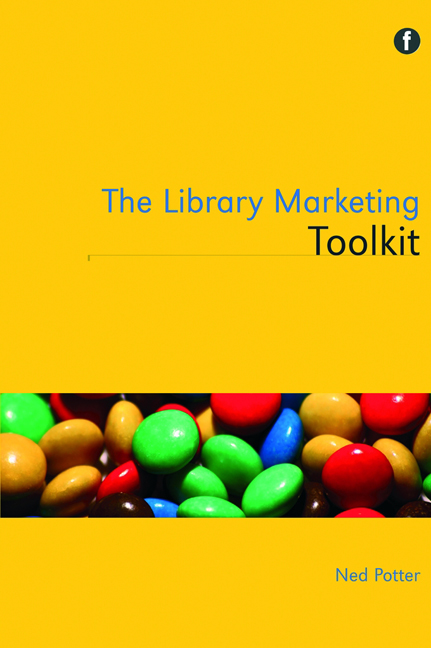Book contents
- Frontmatter
- Dedication
- Contents
- Acknowledgements
- Introduction
- 1 Seven key concepts for marketing libraries
- 2 Strategic marketing
- 3 The library brand
- 4 Marketing and the library building
- 5 An introduction to online marketing
- 6 Marketing with social media
- 7 Marketing with new technologies
- 8 Marketing and people
- 9 Internal marketing
- 10 Library advocacy as marketing
- 11 Marketing special collections and archives
- A final word on marketing libraries
- Appendix: Glossary of Web 2.0 tools and platforms
- References
- Index
1 - Seven key concepts for marketing libraries
Published online by Cambridge University Press: 08 June 2018
- Frontmatter
- Dedication
- Contents
- Acknowledgements
- Introduction
- 1 Seven key concepts for marketing libraries
- 2 Strategic marketing
- 3 The library brand
- 4 Marketing and the library building
- 5 An introduction to online marketing
- 6 Marketing with social media
- 7 Marketing with new technologies
- 8 Marketing and people
- 9 Internal marketing
- 10 Library advocacy as marketing
- 11 Marketing special collections and archives
- A final word on marketing libraries
- Appendix: Glossary of Web 2.0 tools and platforms
- References
- Index
Summary
This brief chapter outlines seven key concepts for marketing libraries, which underpin all the more practical ideas and techniques that follow. Keeping these concepts in mind can help bridge the gap from where much library marketing is now, and where it needs to be for the industry to be able to flourish.
The seven concepts
1 Everyone is trying to get from A to B. We have to show them how we ’ll help get them there quickly and more successfully.
Everyone's on a journey to where they want to go – these days they don't have a lot of time to sit down to consider an offer from a marketer. They ’re running from A to B, head down. As a marketer you ’re going to find it difficult to stop them, turn them around to pay attention to your idea, listen to it and then understand what it means for them. Your best bet is to target messages at them which truly help them get to where they ’re already going and make it absolutely clear how the library helps them to do that. You cannot assume that users will understand what you are talking about and will immediately translate that into what it means for progressing their journey faster with it than without it. That's your job as a marketer, which of course means that you must truly understand the users and their journeys.
Terry KendrickTo understand how to market libraries, it's essential to understand the mindset and circumstances of the people we ’re trying to market them to. This is true across all sectors. We all know that in today's age we ’re bombarded with information, images, messages, advertising, promotion: our daily lives are soundtracked by the white noise of people or things trying to get our attention. As a result we run with our heads down, as Terry Kendrick says in the quote above, just trying to get where we want to go, while ignoring the information overload.
- Type
- Chapter
- Information
- The Library Marketing Toolkit , pp. 1 - 10Publisher: FacetPrint publication year: 2012



